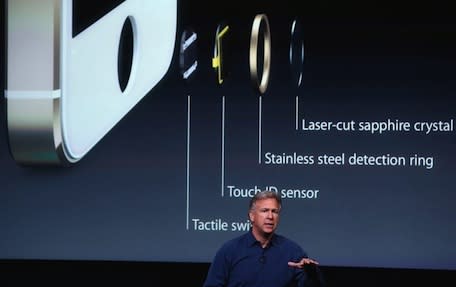Why did Apple's Touch ID elicit paranoia while Samsung's Galaxy S5 flies under the radar?

When Apple first announced the Touch ID feature for the iPhone 5s, we were treated to a few weeks of misplaced paranoia that, if you didn't know any better, would have you believe that Apple was stockpiling user fingerprint data with the intention of selling them to the highest bidder.
Despite a number of security precautions Apple implemented with Touch ID, many in the blogosphere were quick to ring alarm bells. Senator Al Franken even went so far as to write a letter to Tim Cook airing his concerns.
It reads in part:
What's more, a password doesn't uniquely identify its owner-a fingerprint does. Let me put it this way: if hackers get a hold of your thumbprint, they could use it to identify and impersonate you for the rest of your life.
And then there were the endless stream of articles detailing the myriad number of ways people might be able to easily spoof a Touch ID user's fingerprint. The epitome of this bizarre paranoia came in the form of a unintentionally comical Toronto Star article which listed 10 reasons why Apple's Touch ID is a "bad idea."
Yet oddly enough, when Samsung unveiled the Galaxy S5 earlier this week with its own fingerprint authorization scheme, no one seemed to pay it any mind. Never mind the fact that Samsung's fingerprint sensor will be available to third-party developers and that the company announced a partnership with PayPal to enable mobile purchasing.
In short, Samsung is clearly going all in while Apple, in typical fashion, decided to take a more measured approach.
Apple went to great lengths to emphasize just how segmented its fingerprint scanner was from the rest of the hardware, and how isolated (read: protected from hackers) the data that it gathered was. Fingerprint information collected by the iPhone 5s scanner hardware built into Apple's home button is held on a 'secure enclave' within the A7 system-on-a-chip, and communicated to other services only as an encrypted alias that conveys no sensitive data.
Now I don't think any of the brouhaha surrounding Apple's Touch ID was warranted, nor do I think Samsung should be put through the ringer for its implementation. But as John Gruber essentially asks, isn't it bizarre that Apple's Touch ID resulted in a storm of paranoia while a similar feature from Samsung seemingly flies under the radar?
But how come so many people lost their sh*t over the clearly more-secure iPhone fingerprint sensor, and there's not a peep about Samsung's? Where's the letter to Samsung from Senator Al Franken?
Looking ahead, it stands to reason that Apple has its eyes on expanding the scope of Touch ID beyond its current ability to authorize iTunes purchases.
During Apple's most recent earnings conference call, Tim Cook said flat-out that mobile payments was one of the underlying ideas behind Touch ID.
"The mobile payments area in general is one that we've been intrigued with," Cook told analysts last month. "It was one of the thoughts behind Touch ID."
That said, it'll be really interesting to see how the media responds to any future Apple announcements regarding the expansion of Touch ID. I wonder what the Vegas odds are on Al Franken penning a letter to Tim Cook once again.

